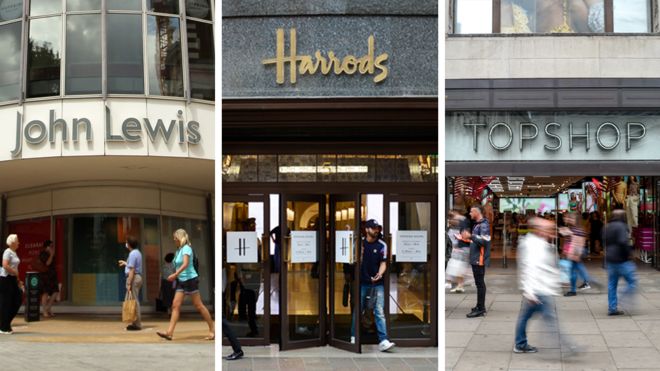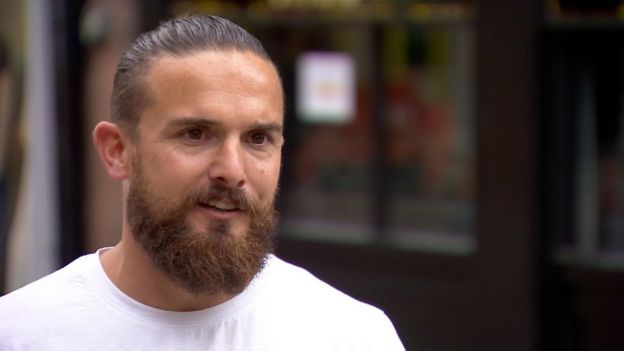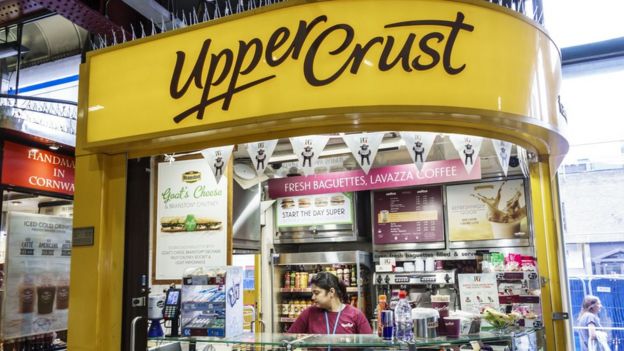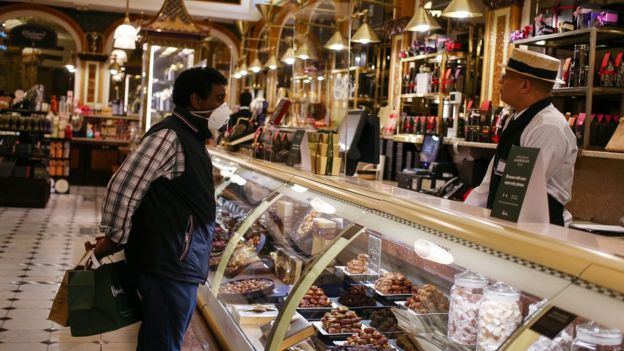 GETTY IMAGES
GETTY IMAGES
More than 12,000 people in the UK are set to lose their jobs after a raft of firms announced cuts in the past 48 hours.
The cuts are mainly being made by High Street retailers and in aviation - two of the sectors hardest hit by the coronavirus lockdown.
John Lewis has said it will close stores but has not confirmed how many jobs will go.
Topshop owner Arcadia and Harrods said they planned a total of 1,180 job cuts.
Where are the cuts falling?
Other lay-offs that have been announced include:
- Up to 5,000 job cuts at Upper Crust owner SSP Group
- Up to 700 jobs at Harrods
- About 600 workers at shirtmaker TM Lewin
- Up to 900 cuts at management consulting firm Accenture
- 300 staff cuts across Virgin Money, Clydesdale Bank and Yorkshire Bank
- 1,700 UK jobs at plane-maker Airbus
- And 1,300 crew and 727 pilots at EasyJet
- Have you recently been made redundant? Share your experiences by emailing haveyoursay@bbc.co.uk.
WH Smith, Bensons for Beds, Wrights Pies, tableware-maker Steelite International, the Adelphi Hotel in Liverpool and Norwich Theatre Royal have also announced plans to reduce staff.
Businesses have been hit hard since the UK went into lockdown on 23 March, and even though restrictions are gradually being eased, consumer demand remains depressed.
The government's furlough scheme will also start to be pared back from August, and firms are cutting jobs to control their costs.
What do employees say?

James Phillips, a mechanical engineer, told the BBC he fears he could be made redundant.
He has been on furlough since March but has now been asked to attend a redundancy consultation meeting with his employer.
He said: "I'm three months away from having a baby, and I was about to sign for a mortgage this week on a new property, so it's impacted me massively, really. Everything's been put on hold."
Sue Hudson lost her job as a legal secretary at a solicitors in Bournemouth in April and has not found a job since.
"There are too many people chasing too few jobs," she told BBC Radio 5 Live. "It's very disheartening."
Why so many job losses now?
For most businesses, staffing is the highest cost, and many have been using the government's furlough schemes to keep workers on.
But the programme - which is paying 80% of the wages of more than 9 million workers - will start to be pared back from next month and will end in October.
 GETTY IMAGES
GETTY IMAGES
As firms have to consult for 30-45 days when making redundancies, some will feel that now is the time to act.
"There is already a cost to the employer from just a month's time," said BBC business correspondent Simon Gompertz.
"Larger employers, planning bigger layoffs, will be eyeing that escalating wage bill and maybe thinking the sooner they move the better."
What have firms said?
In an email to staff, Harrods' managing director Michael Ward said the department store was making its cuts with a heavy heart.
"Due to the ongoing impacts of this pandemic, we as a business will need to make reductions to our workforce."
He said it would take a "drastic improvement in external conditions" for Harrods to recover and return to growth.
John Lewis, which was already looking to "right size" its business before the crisis, said it had not decided which shops would close.
"The reality is that we have too much store space for the way people want to shop now," the company said in a statement.
Topshop owner Arcadia, which is slashing a fifth of its head office staff, also blamed the pandemic for its cuts.
"Due to the impact of Covid-19 on our business including the closure for over three months of all our stores and head offices, we have today informed staff of the need to restructure our head offices," it said.

Does the government need to do more?
The reason the government has thrown tens of billions of pounds at trying to hold back the waves of unemployment is they realise that it does long-lasting damage to demand in the economy.
There is no doubt that the furlough scheme helped delay the impact, but this barrage of job cut announcements suggests the government is now struggling to turn the tide.
Boris Johnson described the virus as "still circling like a shark in our waters". It was an odd metaphor to use, considering the PM has previously praised the Mayor in Jaws for keeping the beaches open.
One thing seems certain: to combat the huge economic shock whose repercussions are being felt in airlines, factories and now high streets, the government will need a bigger boat than the £5bn of previously announced spending accelerated yesterday.
The pressure is now on Chancellor Rishi Sunak.

 GETTY IMAGES
GETTY IMAGESWhy is retail being hit so hard?
Retailers were already struggling before the coronavirus due to changes in shopping habits as consumers buy more online, as well as rising wages and business rates.
But the coronavirus crisis has placed huge pressure on an already weakened sector.
The vast majority of shops were told to shut in March when the UK went into lockdown, prompting a sharp fall in sales.
And while demand rebounded 12% in May, retail it remains well below pre-lockdown levels.
What about aviation?
Demand for air travel in April and May was down more than 90%, as airlines were hit hard by global lockdown measures and travel restrictions. And normal levels of demand are not expected to return for up to three years.
While planes aren't flying, airlines aren't making money, but they still have funds flying out of the door.
And firms that rely on airlines flying, such as commercial aerospace businesses, have decreased production.
Along with cuts at Airbus, Ryanair and EasyJet, British Airways has announced plans to slash 12,000 jobs - almost a quarter of its workforce.
Meanwhile, engineering giant Rolls-Royce, which makes jet engines, will cut 3,000 jobs across the UK.
No comments:
Post a Comment